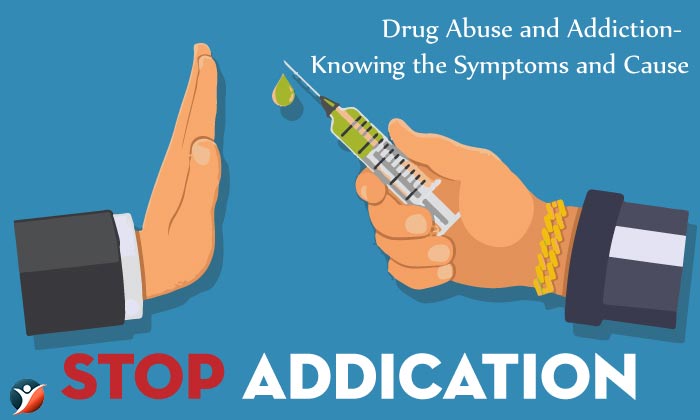
Understanding Drug Abuse and Addiction with Effective Treatments

People from all walks of life can face problems with drug use irrespective of age, race, and background. While some are able to use prescription and recreational drugs without experiencing any negative effects, others find that particular drug is taking a toll on their health and overall well-being. Drug abuse and addiction can leave you feeling helpless, isolated or ashamed. But, don’t worry as you can overcome these issues with proper medications and treatment.
So, before discussing about the symptoms and causes of drug abuse and addiction, let’s know what exactly is the meaning of these two terms.
What is drug abuse and addiction?
Drug abuse or substance abuse basically is a health condition in which a person continues using the legal or illegal drug despite negative consequences. While drug addiction is known as a mental disorder which is developed by prolonged use of the drug which alters the brain’s chemistry.
Symptoms of drug abuse and addiction
1. Symptoms of drug abuse
Well, the symptoms of drug abuse are completely dependent on the substance being abused, genetic makeup of the abuser, frequency of abuse etc. Here we have listed some common symptoms of drug abuse:
- Anxiety
- Depression
- Euphoria
- Lack of motivation
- Mood swings
- Irritability
- Using drugs in a risky condition
- Hallucinations
- Aggressiveness
- Physical dependence on drugs
- Blackouts
- Infections
- Hyperactivity
- Bloodshot eyes
- Loss of control over drug use
- Decrease in respiration rate
- Lethargy
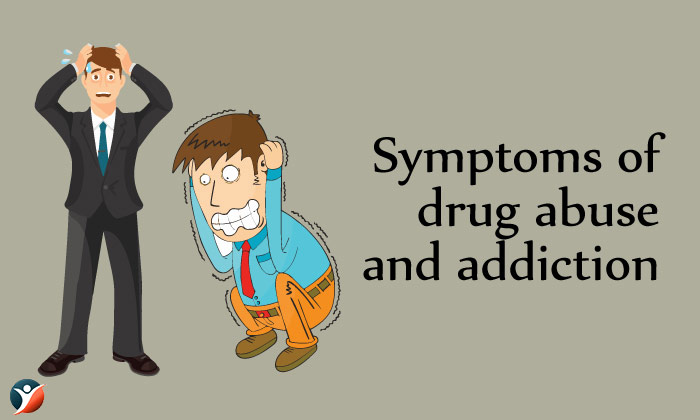
1. Symptoms of drug addiction
Just like the symptoms of drug abuse, in case of drug addiction, the symptoms are completely dependent on the drugs to which the patient is addicted. Still, we have compiled a list of some common symptoms that can verify if a person is addicted to a drug or not.
- Strong urge to use drug on a regular basis- daily or several times in a day.
- Taking drugs in larger amount than the intended amount.
- Having such an intense urge for drugs that it can block other thoughts.
- Spending too much on drugs, even when you can’t afford it.
- Not meeting the work responsibilities and avoiding social gatherings because of drug use.
- Making sure to maintain the supply of the drug.
- Continuing the use of the drug even when it is creating problems in your life and causing psychological and physical harm.
- Things you normally wouldn’t do like stealing.
- Failed attempts while trying to quit drugs.
- Performing risky activities when under the influence of drugs.
- Spending a great amount of time on getting drug, using it and then recovering from its effect.
- Experiencing withdrawal symptoms while quitting drugs.
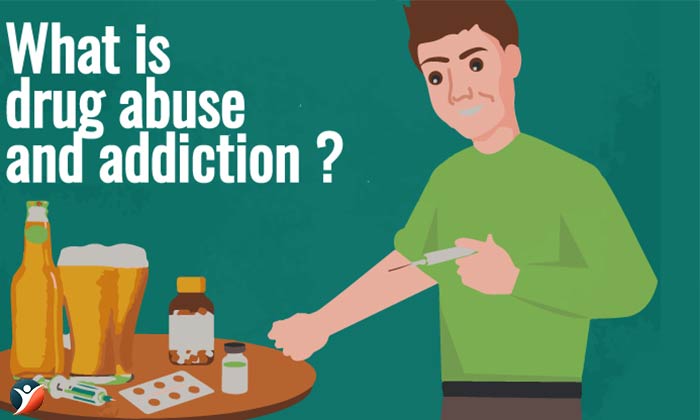
Causes of drug abuse and addiction
Well, people start using drugs for various reasons. Some start experimenting with the drugs out of curiosity, to have a good time, or to get relief from depression, stress or anxiety. But, have you ever wondered what is the main cause behind drug abuse or addiction? Well, to help you get a clear picture we have listed the common causes of drug abuse and addiction.
There are many reasons that can make a person abuse a drug. Still, the experts in the field of addiction have found causes which are believed to make an individual more susceptible to abuse drugs:
- Genetic: Researchers have found that a set of genes that can make an individual vulnerable to develop issue of substance abuse. According to data, if a person has a first-degree relative who has struggled with substance abuse, addiction or chemical dependency, that individual is at the risk of developing the similar challenge at some point during his or her lifetime.
- Environmental factors: Apart from genetic influences, the environment and places where one spends most of his/her time can also have an impact on whether an individual will abuse the substances or not. For instance, the person who is exposed to substance abuse at an early age is more vulnerable to abuse the substances lack coping skills and social support. Additionally, a history of experiencing trauma or associating him/her with others who abuse drug are at a higher risk of developing drug abuse.
However, the factors causing drug addiction are more or less similar to drug abuse, but there are some risk factors that can affect the likelihood and speed of developing addiction:
- Early use: Using drugs at an early age can cause changes in the developing brain and increase the chances of getting addicted to drugs.
- Peer pressure: Well, it is a very common factor among young people for starting and misusing drugs.
- Using highly addictive drug: Some drugs like cocaine, stimulants and even the opioid can result in faster development of addiction. And smoking and injecting these drugs can increase the potential for addiction.
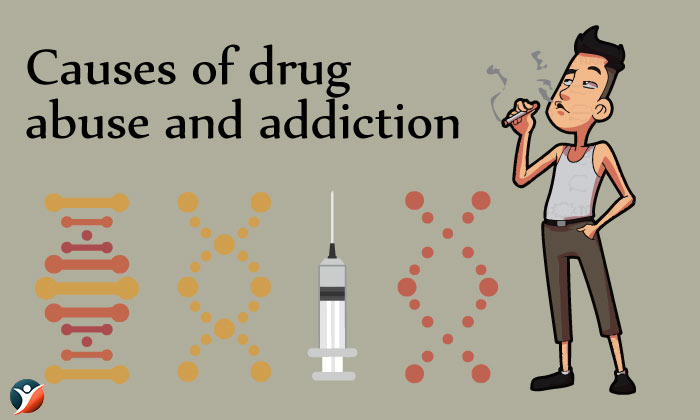
Drug abuse and addiction effect on brain
For most people the initial decision to take drugs is voluntary. But, as the usage of drugs converts into abuse, they get swept into a cycle of addiction, the neural pathways of the brain are affected badly. Furthermore, it makes your brain unable to control your behaviour and resist the intense urge for drugs.
It works in this way when your brain experiences pleasure it triggers the release of feel-good chemicals like dopamine. But, when you are under the influence of drugs, it triggers the release of excess dopamine which makes a person feel high and compels them to repeat the same experience. And when these are used on a frequent basis, they condition their brain to use the same substance.
Moreover, in some cases, the brain is wired in such a way that the addictive behaviour no longer provides any pleasure instead using drugs becomes a way to avoid withdrawal and to feel normal.
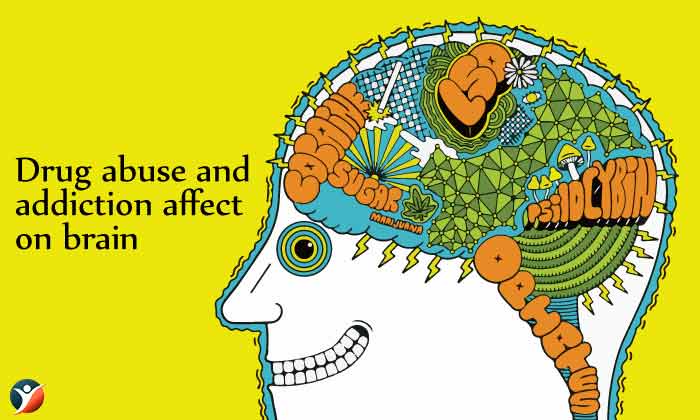
Treatment for drug abuse and addiction
The drug abuse treatments not only help the addict to detoxify in a safe environment but also assists them to go through all the stages of the recovery process. But, if the drug abuse has increased to a certain level and if a person is experiencing all the signs and symptoms of addiction then, a diagnosis is required.
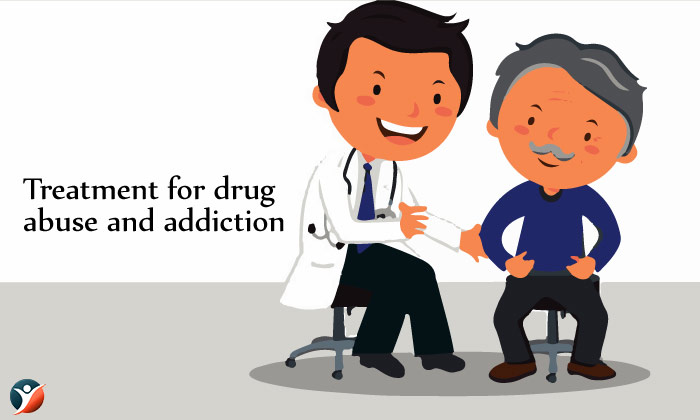
Diagnosis of addiction
For diagnosis of addiction, a thorough evaluation is required with an assessment by a psychologist or psychiatrist to determine addiction which includes:
- Unable to quit drugs
- Not meeting the obligations at work
- Compulsive use of drugs even after knowing the consequences
- Experiencing withdrawal symptoms
- Physical tolerance to the effects of the drug.
Though, it is not necessary that a person needs to meet all the points to have addiction as some drugs don’t create physical tolerance and withdrawal symptoms.
Once the diagnosis is done your doctor will suggest the best possible treatment according to the level of drug abuse and addiction. Here we have listed some known and effective treatments.
1. Detoxification: The detoxification or the withdrawal therapy is a treatment which stops an addict from taking the addicting drug quickly and safely as possible. There are many people who can easily overcome the addiction by simply joining the outpatient program. But, in case of few, residential treatment or admission to the hospital becomes necessary.
Generally, the detox process involves gently reducing the dose of the drug or temporarily substituting with the other substances like methadone, or combination of naloxone and buprenorphine.
2. Self-help groups: These groups use the 12-step model developed by the Alcoholics Anonymous. According to these groups, addiction is a chronic disorder which has a danger of relapse, and for this reason, these groups provide the addicts with a safe environment and help in decreasing the shame and isolation that may lead to relapse.
3. Behaviour therapies: During the drug treatment, the patient can also undergo a behaviour therapy which is done by a psychologist, psychiatrist or a counselling by a licensed counsellor. During these sessions the counsellor or therapists may:
- Help the patient to cope with the drug cravings
- Suggest ways to deal with relapse
- Discussing the problems related to work and family
- Providing different strategies to avoid drugs
- Addressing other mental health conditions
Conclusion
Well, there is a very thin line of difference between drug abuse and addiction, and in no time abuse can transform into an addiction. So, whenever you notice these signs of abuse make sure you keep an eye over your abuse and don’t let it develop into an addiction. And if things are getting out of your control then, take some professional help as soon as possible.




